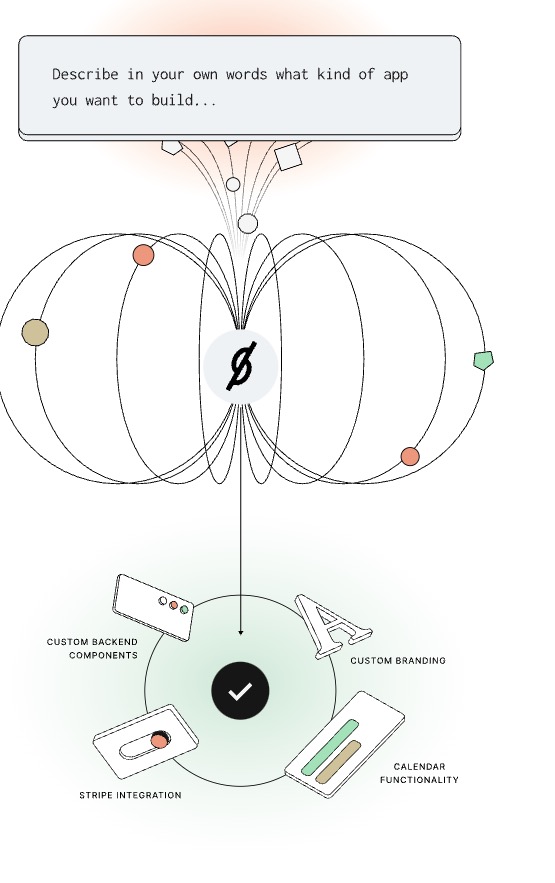Sutro introduces AI-powered app creation with no coding required
AI is already transforming the way we search, gather information, create, code, decipher data and more, and now it may democratize the process of building an app, too. A new AI-powered startup called Sutro promises the ability to build entire production-ready apps — including those for web, iOS and Android — in a matter of minutes, with no coding experience required.
The idea is to allow founders to focus on their unique ideas by leaning on Sutro to automate other aspects of app building, including the necessary AI expertise, product management and design, hosting, use of domain-specific languages, compiling and scaling.
The company was founded in late 2021 by Tomas Halgas, who sold his previous startup, the group chat app Sphere, to Twitter, alongside former Google and Facebook Product Manager Owen Campbell-Moore. The two have taken turns running the company, with Campbell-Moore at the head while Halgas worked at Twitter in its chaotic days leading up to Elon Musk’s takeover. Now, with Halgas having departed Twitter, he’s acting as CEO as Campbell-Moore has shifted to a day job at OpenAI.
Halgas, whose background is in machine learning and compilers, imagines Sutro as something that functions as your entire product team — something that would allow app building to become as simple as creating a website.
“Since university, we’ve always talked about how antiquated the craft of software engineering is,” Halgas tells TechCrunch. “We spent so much time thinking and working on technical minutiae, rather than thinking about what would make a technical product unique.”
For example, when starting a new project, Halgas says developers have to spend days figuring out things like infrastructure, authentication, security and other “data plumbing” before they can actually begin working on their idea.
“It’s completely insane — there has to be a way to basically automate all the stuff that’s common,” he had thought to himself.

Image Credits: Sutro
At the same time, the founders were watching the developments of GPT with interest, realizing that something transformative was coming our way, that would be part of the future. They imagined building a platform that could stand in as your product managers, marketers, engineers and data scientists, where you could present your idea and your target market and the team would get to work mocking up a product, tweaking the design, deploying the servers, patching the vulnerabilities, getting the analytics working and then scaling its seamlessly as it grows.
AI, however, is not yet capable of doing all the heavy lifting here, especially when you’re looking at building an app, which may include tens of thousands of lines of code. So Sutro instead combines the best of AI — GPT-4 and other LLMs to build the web, mobile and back end of apps — with the best of rule-based compilers. On the AI side, most of the work is handled via GPT, though the team has also tapped into open source models in some areas.
Then, on the compiler side, they’ve built proprietary technology that allows you to begin the process of app development via a prompt, where you describe the product you want to make.
After prompting, Sutro will then apply its LLM-powered AI to generate your iOS, Android and web clients and set up the production back end. There’s also a studio toolkit where you have abilities to change things to meet your needs, including the visual style and other aspects of the app’s function and design. Customers can either access the product themselves in a self-serve mode, or they can work in tandem with Sutro’s team to develop their apps. When the project is complete, users can publish the app and continue to edit, maintain and upgrade it as needed.
“What I’d like to highlight is that this is not just another no-code platform,” notes Halgas. “In a no-code platform, you usually come in and you drag and drop something, and it’s still very low level. It’s still a lot of work to get anything working. We are much more like your entire development or your entire product team rather than another no-code tool,” he says.
That is, users can make high-level changes without much effort. For example, you could ask the product to add ratings to posts in an app and Sutro is then able to know where it needs to add the ratings feature, introduce a ranking algorithm or perform aggregation of those ratings, Halgas explains. Users can also enter their own custom code, custom components, and custom integrations.
The company has a demo where they build a basic version of Pinterest in about 60 seconds (see below).
Because Sutro is handling the hosting and all the work under the hood of app building, the company charges its customers on a subscription basis, depending on the size and complexity of the project and how difficult it is to maintain. The startup isn’t yet ready to disclose its pricing, which is currently being discussed with vetted customers in private, but notes that it’s “a fraction” of hiring a development team.
Currently, Sutro is being used by 715 makers who have now built 934 apps using its system.
A small team based in London and San Francisco, Sutro includes those with engineering backgrounds from Uber, Twitter, Meta and Google. The company this week has published its new landing page, and is now open to requests for access from interested parties.
Sutro previously raised $2.2 million from Eniac Ventures and other angel investors, including Peter Welinder, VP of Product and Partnerships at OpenAI.

